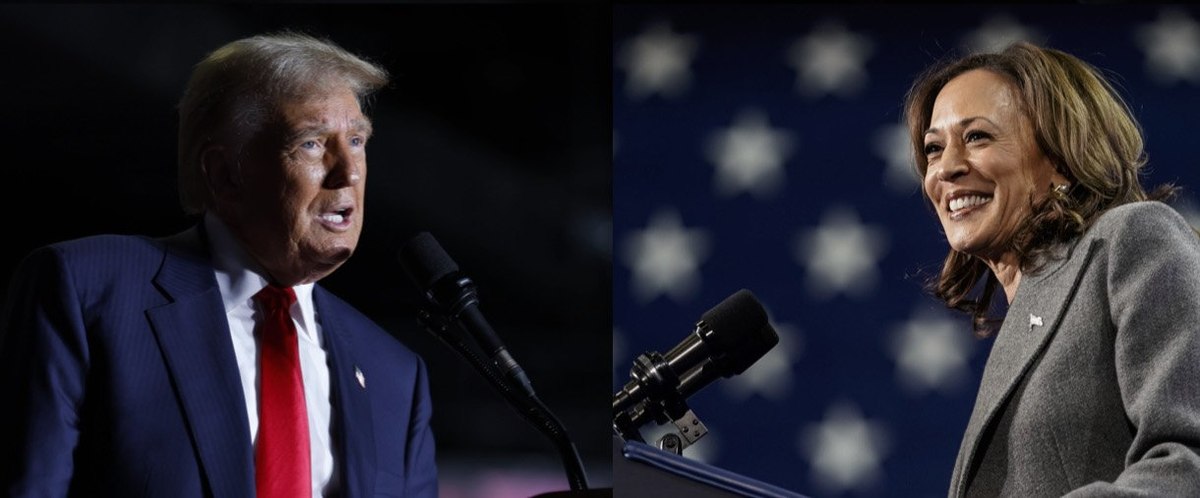As the 2024 presidential election approaches, we take a deep dive into the policies that registered voters support, the issues they care about, and the candidates they trust to handle them.
In a series of surveys, YouGov explores registered voters' attitudes towards eight major issues relevant to the upcoming election. See details of the public's views on each of the following topics:
About the project
The project consists of eight surveys, each of them focused on a specific issue and policies related to that issue that have been proposed by the major parties or presidential candidates during the 2024 election cycle. The eight surveys sought opinions on 128 policies: 64 of them Democratic and 64 of them Republican — made up of eight policies for each party related to each of the eight issues.
The policies asked about in this survey are adapted from proposals included in the 2024 Democratic and Republican Party platforms, as well as publicly available candidate interviews, speeches, debates, and online posts as of September 18, 2024. We attempted to phrase the policies as neutrally as possible while retaining the meaning intended by the party or candidate proposing it. See more information on the policies included.
In each survey, respondents were asked whether they support or oppose each policy, which was not described in the survey as being connected with a particular party or candidate. After providing their opinions on each policy, respondents were asked which candidate they think supports it, with options of Kamala Harris, Donald Trump, both, or neither. The surveys were conducted among U.S. adult citizens, though our analysis focuses on the views of registered voters.
While our surveys aim to present a balanced view of policy support, the distribution of policies in our polls doesn't necessarily reflect the emphasis placed on them by the candidates or voters. Some issues are critical to voters than others. Our method allows for easier comparison between candidates but doesn't account directly for the weight placed on each issue. Additionally, policy support does not always translate to electoral success. Even if a candidate proposes highly popular policies, the popularity of their agenda might not convert into votes, for a number of reasons. For example, voters might not associate these policies with the candidate, might not believe they can be achieved, or might prioritize other factors such as personal characteristics.
Summary of findings
- Across nearly all issues, policies backed by Harris and the Democratic Party are, on average, more popular than those backed by Trump and the Republican Party. 89% (57 out of the 64) of Harris' policies included in the survey are supported by more than half of voters. The same is true for just 48% (31 of 64) of Trump's policies.
- Harris' policies are more likely than Trump's to be supported by voters overall (67% average support for Harris' vs. 51% for Trump's).
- Her proposals also are more popular among her supporters (83% average support) than Trump's are among his (71%).
- Trump's supporters are more favorable towards Harris' policies (51% support) than Harris' are towards Trump's policies (34%).
- 53% of Harris' policies and 19% of Trump's policies are bipartisan, which we define as being strongly or somewhat supported by more than 50% of Democrats and also by more than 50% of Republicans (a recent YouGov project found 109 national policies with bipartisan support).
- Harris' policies excels most relative to Trump's on health care and social issues.
- Many of Harris' health care policies receive bipartisan support, including increasing in-home care funding, investigating anti-competitive behavior by pharmaceutical companies, and expanding Medicare drug price negotiations.
- Allowing more refugees to enter the U.S. is Harris' least popular policy, and her second least popular is increasing the royalties that oil and gas companies are charged to drill or mine on public lands.
- Harris' proposals to expand birth control access and establish paid family leave are favored by majorities of her own supporters and Trump's. A majority of voters also support her plan to restore abortion rights nationally as they were under Roe v. Wade, though views on this are more polarized.
- Trump's strengths with voters generally lie in policies related to the economy and immigration. Even in these areas, though, Trump's specific policies are on average no more popular than Harris'.
- Large shares are in favor of Trump's proposals to eliminate taxes on Social Security income and to use the Alien Enemies Act to deport certain immigrants.
- Among Trump's least popular policies are deregulating cryptocurrency, reducing automobile fuel-efficiency standards, and eliminating the U.S. Department of Education.
- Trump's proposals on crime also are among his least supported: Few favor allowing the death penalty for drug dealers, giving qualified immunity to police officers, or pardoning participants in the January 6, 2021 attack on the U.S. Capitol.
- Voters are equally likely to associate Harris' policies with her (60% do, on average) as they are to associate Trump's policies with him (59%). The recognizability of their policies varies by topic, however.
- An average of 74% of Harris' supporters correctly identify her policies, which is slightly higher than the 64% of Trump's supporters who recognize his.
- As for recognizing their opponent's policies, an average of 58% of Harris supporters do so, compared to 49% of Trump supporters.
- An average of 8% attribute policies included in the survey to both candidates and 6% to neither candidate; 23% say they are not sure which candidate it is supported by.
- Harris is most likely to be connected to her positions on social issues. Eight in 10 are aware she supports restoring abortion rights as they were under Roe v. Wade. Her health care policies, which also are among her most popular, are less recognizable to voters, especially Trump supporters.
- While Harris recently has emphasized more hardline stances on immigration, few voters associate these positions with her. For instance, majorities of Harris' and Trump's supporters mistakenly think the proposal to limit border crossings after an average of more than 5,000 migrants per day try to cross unlawfully is a Trump proposal rather than Harris'.
- Trump's immigration policies, on the other hand, are among his most recognizable. Large majorities of Trump's and Harris' supporters know that he has proposed funding a border wall and deporting thousands of illegal immigrants.
- Trump is less likely to be associated with his health care policies. Far more of Harris' supporters link Trump proposals to expand HSAs, require international pharmaceutical price-matching, and fund chronic disease research to Harris than link them to Trump.
- Both Trump and Harris are somewhat less likely to be associated with their more popular policies, possibly because their opponent's supporters are less likely to associate policies they like with a candidate they are planning to vote against.
See the full results for these surveys
See the full list of the policies and their sources
Methodology: These results are based on a series of eight polls conducted between September 18 - October 3, 2024, each among roughly 1,100 U.S. adult citizens and roughly 1,000 registered voters. Respondents were selected from YouGov’s opt-in panel to be representative of adult U.S. citizens. The sample was weighted according to gender, age, race, education, 2020 election turnout and presidential vote, baseline party identification, and current voter registration status. Demographic weighting targets come from the 2019 American Community Survey. Baseline party identification is the respondent’s most recent answer given prior to November 1, 2022, and is weighted to the estimated distribution at that time (33% Democratic, 31% Republican). The margin of error for each survey is approximately 4% for . The margin of error for the overall sample, as well as for registered voters, is approximately 4%. For the questions that have been combined across surveys, it is approximately 1%.
Image: Getty
What do you think about the election, American politics in general, and everything else? Have your say, join the YouGov panel, and get paid to share your thoughts. Sign up here.














